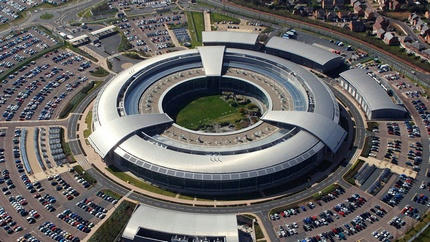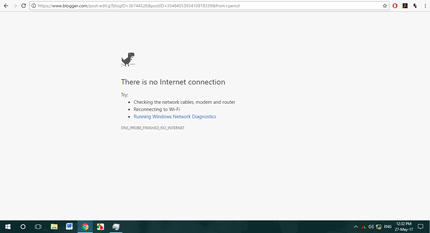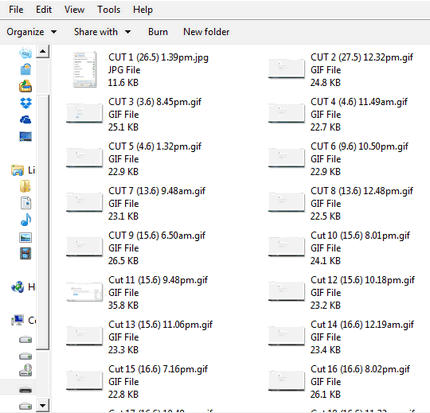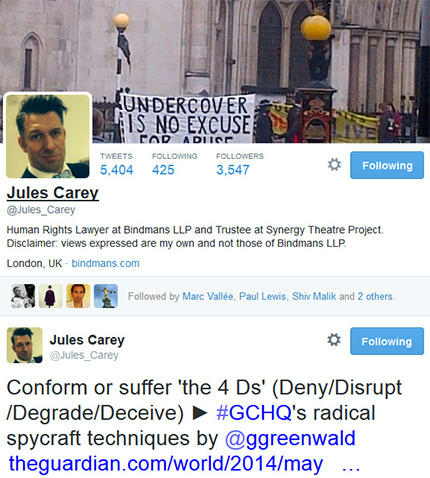INTERNET CUTS: Are we back to non-stop internet cuts? We pay British Telecom £850 per year for broadband (WITH UPDATE 7/7/2018: re 253rd Internet cut since 26 May 2017)
The tyranny of threatened powerful ideologies is exactly what you live to combat.
- Donald A. Collins, President of ISAF, an NGO dedicated to helping women
Our Church and State website has no less than 40 Nobel Prize winners on it; for details, see this blog's sidebar under "Church and State" (updated today).

UK Government Communications Headquarters (GCHQ)
Article 10 of the European Convention on Human Rights and Fundamental Freedoms formulates what is the core of free speech. "Everyone has the right to freedom of expression." In an important interpretation of this article, the European Court of Human Rights in Handyside v. UK (1976) indicated that this "freedom of expression" should be construed as follows. It "is applicable not only to 'information' or 'ideas' that are favourably received, or regarded as inoffensive, or as a matter of indifference, but also to those that offend, shock or disturb the State or any sector of the population." Such are the demands of that pluralism, tolerance and broadmindedness without which there is no "democratic society" (see Cliteur, 2010).

This morning Declan phoned British Telecom (BT) Customer Service about our third ever half an hour removal from the internet yesterday - on the same day as his updated complaint to the United Nations - and our first cut this morning as soon as we started work. BT could not identify a problem. They ran a check on our phone line and Declan was told it was working fine. He was also told there were no problems detected with the broadband in our area.
Re: Broadband (British Telecom)
Paragraph 41 of Declan's updated complaint to the United Nations under Article 19 (freedom of expression) of the International Covenant on Civil and Political Rights.
41. In October 2017, SiteGround's solicitors told the Applicant to remove a popular article from the Church and State website for alleged copyright infringement or the site would be disabled by SiteGround pending his legal challenge by counter notice. The Applicant removed the article even though it had a Creative Commons licence applied to it, as do all Addicting Info articles. The Applicant's wife's Church and State blog has been attacked in various ways over the years: links have been broken and images exchanged, deleted or temporarily removed. So too have the Applicant and his wife's computers. In December 2015, the Applicant's wife's laptop was rendered incapable of publishing material on the Church and State website. She could not create a WordPress post, add images, or click on most of the platform's buttons. She had posted a video of the attack on her blog before the laptop was returned to normal functioning the following afternoon. Since September 2017, the internet connection speed on any one of their four laptops has been reduced from anything between 70-74Mbps to 0Mbps, usually disabling the targeted laptop, and for up to three weeks to date. The laptop most targeted for this form of attack is the Applicant's main laptop that cost him £600 in January 2017. Their internet connection has been cut 184 times since 26 May 2017, most recently today on 8 May 2018 for a half an hour (the third cut of this duration). The Applicant pays British Telecom £850 per year for broadband. He has documented communication with BT Executive Level Complaints showing there has been no problem with his phone line [emphasis added].
Paragraph 41 of Declan's updated complaint to the United Nations under Article 19 (freedom of expression) of the International Covenant on Civil and Political Rights.
41. In October 2017, SiteGround's solicitors told the Applicant to remove a popular article from the Church and State website for alleged copyright infringement or the site would be disabled by SiteGround pending his legal challenge by counter notice. The Applicant removed the article even though it had a Creative Commons licence applied to it, as do all Addicting Info articles. The Applicant's wife's Church and State blog has been attacked in various ways over the years: links have been broken and images exchanged, deleted or temporarily removed. So too have the Applicant and his wife's computers. In December 2015, the Applicant's wife's laptop was rendered incapable of publishing material on the Church and State website. She could not create a WordPress post, add images, or click on most of the platform's buttons. She had posted a video of the attack on her blog before the laptop was returned to normal functioning the following afternoon. Since September 2017, the internet connection speed on any one of their four laptops has been reduced from anything between 70-74Mbps to 0Mbps, usually disabling the targeted laptop, and for up to three weeks to date. The laptop most targeted for this form of attack is the Applicant's main laptop that cost him £600 in January 2017. Their internet connection has been cut 184 times since 26 May 2017, most recently today on 8 May 2018 for a half an hour (the third cut of this duration). The Applicant pays British Telecom £850 per year for broadband. He has documented communication with BT Executive Level Complaints showing there has been no problem with his phone line [emphasis added].
UPDATE 7 July (11.31am): On 10 May Declan phoned BT Customer Service for the umpteenth time. He sought an explanation for why we were cut from the internet the night before, and that morning for 25 minutes (recorded as the fourth time we were cut for a 1/2 hour since May 2017, and the second time in 36 hours). Once again, there was no explanation. Since then we have been cut off the internet 66 times with two more 1/2 hour cuts, 25 1/4 hour cuts, and our first ever 3/4 hour cut last night. We were cut off the internet on 19 June a record-equalling seven times. Up until 8 May, I had been recording internet cuts on my blog post of 21 June 2017, INTERNET CUTS: We pay £65 per month for BT Infinity but feel we are in a race against time to stay online (WITH UPDATE 8/5/2018: re: 184th Internet cut since 26 May 2017). (We now pay BT £70 per month!) These are the internet cuts so far this year:
As from 1 January 2018
1. 174th 6 January 2018, 1.21pm
2. 175th 10 January 2018, 9.42am
3. 176th 11 January 2018, 8.14pm
4. 177th 21 January 2018, 8.02pm
---------------------------------------------------------
5. 178th 5 February 2018, 6.20pm
6. 179th 15 February 2018, 8.42am
7. 180th 20 February 2018, 11.14pm
8. 181st 28 February 2018, 8.10pm
---------------------------------------------------------
9. 182nd 8 March 2018, 6.54am
10. 183rd 10 March 2018, 10.41am
---------------------------------------------------------
No cuts in April
---------------------------------------------------------
11. 184th 8 May 2018, 2.13pm (3rd 1/2 hour)
12. 185th 9 May 2018, 6.31am
13. 186th 9 May 2018, 9.51pm
14. 187th 10 May 2018, 1.05am (4th 1/2 hour)
15. 188th 10 May 2018 12.37pm
16. 189th 10 May 2018 5.18pm
17. 190th 12 May 2018 12.53pm
18. 191st 12 May 2018 11.44pm
19. 192nd 14 May 2018 7.25pm (5th 1/2 hour)
20. 193rd 15 May 2018 11.33am (1st 1/4 hour)
21. 194th 15 May 2018 7.34pm
22. 195th 19 May 2018 8.31am
23. 196th 21 May 2018 5.59pm (6th 1/2 hour)
24. 197th 23 May 2018 1.22pm (2nd 1/4 hour)
25. 198th 27 May 2018 2.01pm (3rd 1/4 hour)
26. 199th 27 May 2018 8.32pm (4th 1/4 hour)
27. 200th 27 May 2018 11.19pm
28. 201st 29 May 2018 9.46am (5th 1/4 hour)
29. 202nd 29 May 2018 11.48am (6th 1/4 hour)
30. 203rd 29 May 2018 8.11pm
31. 204th 29 May 2018 9.37pm
32. 205th 30 May 2018 9.33pm
---------------------------------------------------------
33. 206th 1 June 2018 6.02pm
34. 207th 1 June 2018 7.18pm (7th 1/4 hour)
35. 208th 2 June 2018 5.03pm (8th 1/4 hour)
36. 209th 3 June 2018 2.32pm (9th 1/4 hour)
37. 210th 5 June 2018 11.43pm
38. 211th 12 June 2018 9.15pm (10th 1/4 hour)
39. 212th 12 June 2018 11.30pm
40. 213th 13 June 2018 3.35pm
41. 214th 13 June 2018 7.51pm
42. 215th 14 June 2018 11.22am
43. 216th 14 June 2018 4.31pm
44. 217th 15 June 2018 10.05am (11th 1/4 hour)
45. 218th 16 June 2018 6.02pm (12th 1/4 hour)
46. 219th 16 June 2018 9.47pm
47. 220th 18 June 2018 2.00pm
48. 221st 18 June 2018 4.50pm
49. 222nd 18 June 2018 8.38pm
50. 223rd 19 June 2018 8.36am
51. 224th 19 June 2018 10.35am (13th 1/4 hour)
52. 225th 19 June 2018 12.36pm
53. 226th 19 June 2018 5.33pm
54. 227th 19 June 2018 7.32pm (14th 1/4 hour)
55. 228th 19 June 2018 9.33pm (15th 1/4 hour)
56. 229th 19 June 2018 10.01pm (7)
57. 230th 21 June 2018 8.47am
58. 231st 21 June 2018 1.32pm (16th 1/4 hour)
59. 232nd 21 June 2018 2.03pm (17th 1/4 hour)
60. 233rd 21 June 2018 7.37pm
61. 234th 22 June 2018 10.16am
62. 235th 23 June 2018 11.32am
63. 236th 24 June 2018 11.35am
64. 237th 25 June 2018 11.36pm
65. 238th 27 June 2018 1.17pm (18th 1/4 hour)
66. 239th 27 June 2018 7.21pm (19th 1/4 hour)
67. 240th 28 June 2018 12.49pm
68. 241st 28 June 2018 9.16pm (20th 1/4 hour)
69. 242nd 28 June 2018 9.47pm (21st 1/4 hour)
70. 243rd 29 June 2018 9.02am
71. 244th 29 June 2018 8.47pm (22nd 1/4 hour)
72. 245th 30 June 2018 10.02am (23rd 1/4 hour)
---------------------------------------------------------
73. 246th 1 July 2018 4.48pm
74. 247th 2 July 2018 7.34pm (24th 1/4 hour)
75. 248th 2 July 2018 11.37pm
76. 249th 3 July 2018 2.02pm (25th 1/4 hour)
77. 250th 4 July 2018 12.16am
78. 251st 4 July 2018 10.06pm
79. 252nd 4 July 2018 10.49pm
80. 253rd 6 July 2018 11.46pm (1st 3/4 hour)
Update Summation 7 July 2018
253 internet cuts since 26 May 2017 (173 cuts 2017; 80 cuts 2018). With an all-time record-equally 7 cuts in one day on 19 June 2018 (in bold); 22 cuts in May that included on 8 May the 3rd ever 1/2 hour cut on the same day as Declan's updated complaint to the UN; 40 cuts last month; 8 cuts this month; 10 cuts last week; 8 cuts this week; no cuts so far today (as of 7 July at 11.31am).
January 2018: 4 cuts
February 2018: 4 cuts
March 2018: 2 cuts
April 2018: 0 cuts
May 2018: 22 cuts
June 2018 40 cuts
July 2018 8 cuts (ongoing)
12 out of the first 18 internet cuts in 2017 were within the first four days of a BT engineer's visit on 12 June 2017. It is a matter of written record that this engineer "securely fitted a brand new master socket to another location on the same wall. He also carried out a comprehensive line test and could not find a problem with [our] line".
253 internet cuts since 26 May 2017 (173 cuts 2017; 80 cuts 2018). With an all-time record-equally 7 cuts in one day on 19 June 2018 (in bold); 22 cuts in May that included on 8 May the 3rd ever 1/2 hour cut on the same day as Declan's updated complaint to the UN; 40 cuts last month; 8 cuts this month; 10 cuts last week; 8 cuts this week; no cuts so far today (as of 7 July at 11.31am).
January 2018: 4 cuts
February 2018: 4 cuts
March 2018: 2 cuts
April 2018: 0 cuts
May 2018: 22 cuts
June 2018 40 cuts
July 2018 8 cuts (ongoing)
12 out of the first 18 internet cuts in 2017 were within the first four days of a BT engineer's visit on 12 June 2017. It is a matter of written record that this engineer "securely fitted a brand new master socket to another location on the same wall. He also carried out a comprehensive line test and could not find a problem with [our] line".


Re: Government Communications Headquarters (GCHQ)
Paragraph 12 of Declan's updated complaint to the United Nations under Article 19 (freedom of expression) of the International Covenant on Civil and Political Rights.
12. It is important to underscore that the discriminatory surveillance suffered by the Applicant and his wife is not an isolated event. Rather, it is emblematic of a larger pattern of surveillance by law enforcement officials in the UK that has been well-documented by international and domestic human rights bodies. For example, GCHQ's Joint Threat Research Intelligence Group (JTRIG) specialises in the "4 D's": deny, disrupt, degrade, deceive. It has been branded by the press as the spy agency's "deception unit". Though its existence was secret until 2014, JTRIG has developed a distinctive profile in the public understanding, after documents from NSA whistleblower Edward Snowden revealed that the unit had engaged in "dirty tricks" like deploying sexual "honey traps" designed to discredit targets, launching denial-of-service attacks to shut down Internet chat rooms, pushing veiled propaganda onto social networks and generally warping discourse online. Previous reporting on GCHQ established its focus on what it regards as political radicalism. Beyond JTRIG's targeting of Anonymous, other parts of GCHQ targeted political activists and groups deemed to be "radical", even monitoring human rights NGOs. Simon Davies, founder of the London-based Privacy International, asks: "If spying on human rights NGOs isn't off limits for GCHQ, then what is?"
Paragraph 12 of Declan's updated complaint to the United Nations under Article 19 (freedom of expression) of the International Covenant on Civil and Political Rights.
12. It is important to underscore that the discriminatory surveillance suffered by the Applicant and his wife is not an isolated event. Rather, it is emblematic of a larger pattern of surveillance by law enforcement officials in the UK that has been well-documented by international and domestic human rights bodies. For example, GCHQ's Joint Threat Research Intelligence Group (JTRIG) specialises in the "4 D's": deny, disrupt, degrade, deceive. It has been branded by the press as the spy agency's "deception unit". Though its existence was secret until 2014, JTRIG has developed a distinctive profile in the public understanding, after documents from NSA whistleblower Edward Snowden revealed that the unit had engaged in "dirty tricks" like deploying sexual "honey traps" designed to discredit targets, launching denial-of-service attacks to shut down Internet chat rooms, pushing veiled propaganda onto social networks and generally warping discourse online. Previous reporting on GCHQ established its focus on what it regards as political radicalism. Beyond JTRIG's targeting of Anonymous, other parts of GCHQ targeted political activists and groups deemed to be "radical", even monitoring human rights NGOs. Simon Davies, founder of the London-based Privacy International, asks: "If spying on human rights NGOs isn't off limits for GCHQ, then what is?"
Is Edward Snowden a Hero or Criminal? This is a solid documentary called #Citizenfour that may influence your thinking either way:
JOIN THE CONVERSATION #CITIZENFOUR
From My Picks
8 May 2018 (previous blog post): Threat to life: Updated complaint to the United Nations under Article 19 (freedom of expression) of the International Covenant on Civil and Political Rights. Today we are cut off the internet for a half an hour

http://churchandstate.org.uk/honorary-associates/

